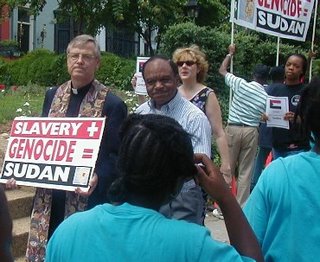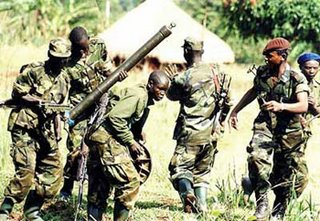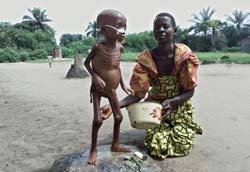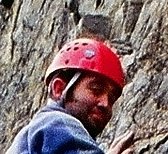The Effects of Protest and Rumblings of War in the Congo
In my last post, I wrote that Talisman inc, a Calgary-based oil company operated in the Sudan during the civil war between the muslim Khartoum government and the Christian/animist militias in the south. This was true. However, a good friend pointed out to me that Talisman, due to pressure from human rights groups has withdrawn from the Sudanese projects until peace comes to Sudan. The U.S. government also applied pressure to Talisman, threatening to pull it from US markets. The larger project, from which Talisman sold its stake, the Greater Nile Oil Production and Pipeline project still continues to operate with companies from Malaysia, China, India, and Sudan's domestic company. Ultimately, it's a small victory, but a victory nonetheless that shows the positive effects of large-scale protest.

Such protests took place yesterday en masse in Washington DC, and smaller scale in Ottawa, Toronto and Vancouver. At least one members of the Project for the New American Century (PNAC) has spoken publicly about military intervention in Sudan "because we can't allow dictators to kill their own people." This quote of course is not found anywhere in PNAC a document that was written before 9/11 and was concerned with establishing the United States of America as the only true world power and empire. Tenets of PNAC include the rolling back of civil liberties of Americans, fighting and winning multiple theatre wars, military control of space and cybersapce. Chillingly, the document wrote that such actions could not be done unless a "second pearl harbour" a cataclysmic event happened. Along come the attacks of 9/11, and
PNAC becomes policy. Since Bush has taken power, PNAC has had a name change and was referred to as the 'Freedom Doctrine" by Bush in his second inaugural address. Most people will tell you that the war in Iraq and Afghanistan is about control over regional resources (oil and gas mainly). As Gwyn Dyer points out, the wars are a way of showing potential regional rivals (such as the EU, or China) that the US "no longer plays by the rules" in terms of international law. The Iraq war was an illegal war by UN standards. The US has made a strong play to hold down Iraq and Afghanistan. Let us not forget how resource rich Iran and Sudan are. The chink in PNAC's armour, is that the US military is exhausted from combat in Iraq. The idea of the US fighting in multiple theatres and winning is ludicrous to comanders of their military forces. It is no surpise the the members (Cheney, Rumsfeld, Wolfowitz, and Richard Perle) have never served a day in the military.
As late as the spring of 2004, there were rumblings of war in the Democratic Republic of the Congo. Observers worried that it might result in a repeat of the first African World War (1998-2003) that involved 6 nations and left 3 million dead. The main opponents in the war are long-time rivals Rwanda and the government forces of the Congo. To put the deaths of this war in perspective (deaths from fighting, starvation, and disease) it would be the equivalent of a 9/11 catastrophe every day and half for 5 years straight. The wild and lawless regions of eastern Congo are home to anti-Rwandan militants (many the escaped perpetrators of the Rwandan genocide), Rwandan-friendly militias, and Congolese troops. In early June 0f 2004, two miltias occupied the Eastern Congo city of Bukavu for a week. Joseph Kabila, the rebel leader who ousted Mbutu sese seko's brutal regime in the 90s, responded by chasing the rebels out and posting between 5000 and 10,000 Congolese troops along the Rwandan border. Rwanda cites its involvement in the Congo as protecting their nation from the anti-Rwandan militias. It must be said however, that Rwanda desperately needs the energy resources in that region for their power-starved nation.

However, Rwanda still relies heavily on foreign aid which they run the risk of losing should they launch any military offensive into the Congo. The U.N. has its most expensive mission in this region of the Congo, and U.N. helicopters launched attacks at rebel militias to drive them from Bukavu. One group retreated, the other did not. The DR Congo still has the world's largest concentration of child soldiers, though as many as 15,000 have been demobilized. The DR Congo's UNICEF head of office Massimo Altimari rarely if ever visits the site he funds. The BBC quotes him as saying, "The situation doesn't permit all the displaced people to go back to their villages because they are scared, they are tired...We have no government here, the government is represented by the army and the army is not behaving well."
This war bears another grim description in which rape is commonly used as a weapon of war. A church hospital in the region houses rape victims, many just teenagers, and in three year has treated as many as 4,500 victims alone from their region. The majority of the deaths in Africa's long war are children dying from preventable diseases reports Amnesty International.
Though sporadic fighting continues in the vast regions of Eastern Congo, the real crisis emerging in the humanitarian one caused by years of vicious combat. Villages have been destroyed, children abducted for use in the various militias, and disease runs rampant. Organisation such as UNICEF fear entering the region for their own personal safety.



0 Comments:
Post a Comment
<< Home